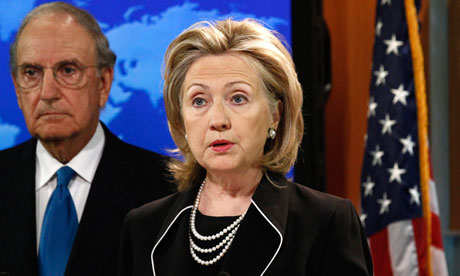Israel and Palestinians to resume peace talks in Washington
![]()

Hillary Clinton hopes a peace agreement can be reached within a year, in first direct negotiations since 2008
Israel and the Palestinians are to resume direct peace talks next month under pressure from Washington to break years of political stalemate.
The US secretary of state, Hillary Clinton, announced that the Israeli prime minister, Binyamin Netanyahu, and the Palestinian president, Mahmoud Abbas, would meet in Washington on 2 September to “relaunch direct negotiations to resolve all final status issues which we believe can be completed within one year”.
Netanyahu welcomed the talks.
“We are coming to these talks with a serious desire to reach a peace agreement between nations, while still preserving Israel’s national interests, security being the foremost of them,” he said.
But some Israeli and Palestinian former negotiators and politicians greeted the news with scepticism, saying Abbas was only participating under US pressure and Netanyahu had no immediate political interest in reaching a peace agreement.
Clinton said the Egyptian and Jordanian leadership had also been invited to the opening of the negotiations, with Tony Blair, the envoy for the quartet of the US, UN, EU and Russia, “in view of his important work to help Palestinians build the institutions of their future state”.
“As we move forward it is important that actions by all sides help to advance our effort not hinder it. There have been difficulties in the past. There will be difficulties ahead. Without a doubt we will hit more obstacles. The enemies of peace will keep trying to defeat us and to derail these talks. But I ask the parties to persevere, to keep moving forward even through difficult times and to continue working to achieve a just and lasting peace in the region,” Clinton said.
The US said all main issues would be on the table, including the difficult final status questions of the borders of a Palestinian state, the division of Jerusalem and the right of return for Palestinian refugees.
The US Middle East envoy, George Mitchell, said he believed it was realistic to include a one-year deadline to resolve core issues on which neither side has been able to reach agreement since the 1993 Oslo peace accords.
“We believe it can be done within a year and that is our objective,” he said. Netanyahu and Abbas were “sincere and serious” about peace, he added, and Washington would take a hands-on role in guiding the talks because it was “in the national security interests of the United States“.
The date for negotiations was set only after the Obama administration pressured Abbas into agreeing to talks. Abbas has sought guarantees from the US that the Palestinians would not be drawn in to perpetual negotiations that go nowhere while Israel continues to expand in the occupied territories. The White House offered the one-year deadline for talks as a reassurance.
A senior Israeli official said that the government recognises that the Palestinians have come to the negotiating table reluctantly and that Abbas is politically weak. But he said that with all issues on the table, there is the potential to make progress.
Asked whether there are red lines for Israel, including Netanyahu’s previous claim to all of Jerusalem, the official said the only unshakeable demands are guarantees of Israel’s security and Palestinian recognition of Israel’s legitimacy.
Mitchell said he accepted there was continued hostility between the two sides but compared the Middle East talks to his experience of “700 days of failure and one day of success” as the Northern Ireland peace broker.
William Hague, the British foreign secretary, said: “A two-state solution is the only hope for lasting peace and security. Today’s announcement is a courageous step towards that goal.”
Moty Cristal, a negotiations expert and adviser to previous Israeli prime ministers, said: “Netanyahu is buying time, looking for ways to stay away from any action on the ground and have more time in leadership. Netanyahu doesn’t think that the Palestinian situation is any threat or has any urgency. The urgency for him is the Iranian affair.”
Abdul Rahman Zidan, a former minister in the Hamas government, said: “Nothing positive will come out of these fruitless talks – we have tried this way several times. The Americans and the Israelis need talks – any talks – just for the feeling that there is a peace process. But for us, this is a negative, empty feeling because there is nothing on the table. It’s a merry-go-round,” he said.
Related Articles
Palestine Papers
![]()
Now we know. Israel had a peace partnerThe classified documents show Palestinians willing to go to extreme lengths and Israel
The writer and academic Refaat Alareer killed yesterday by Israeli bombs
![]()
The last thing he wrote to his friends was: “The situation is very desolate, we don’t even have water… I only have my pen, I will throw it at the occupying soldiers if they invade, even if it were to be the last thing I’ll do”
Gazan youth issue manifesto to vent their anger with all sides in the conflict
![]()
An anonymous group of students has created a document to express their frustration born of Hamas’s violent crackdowns on ‘western



